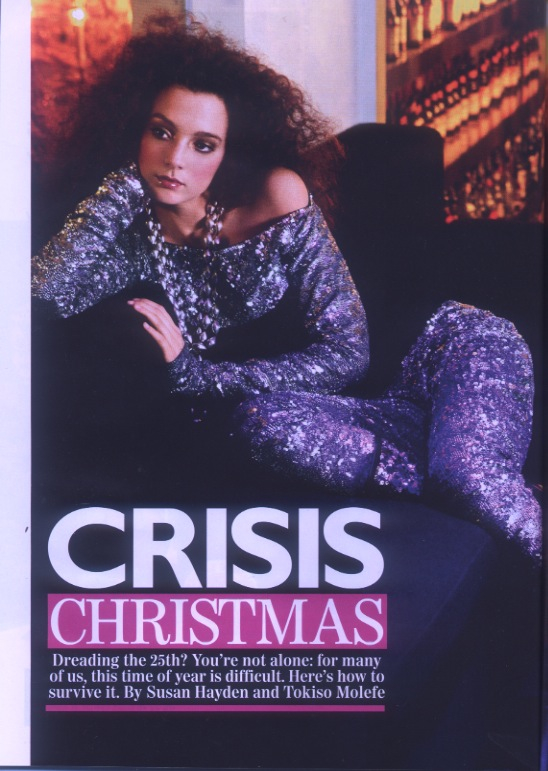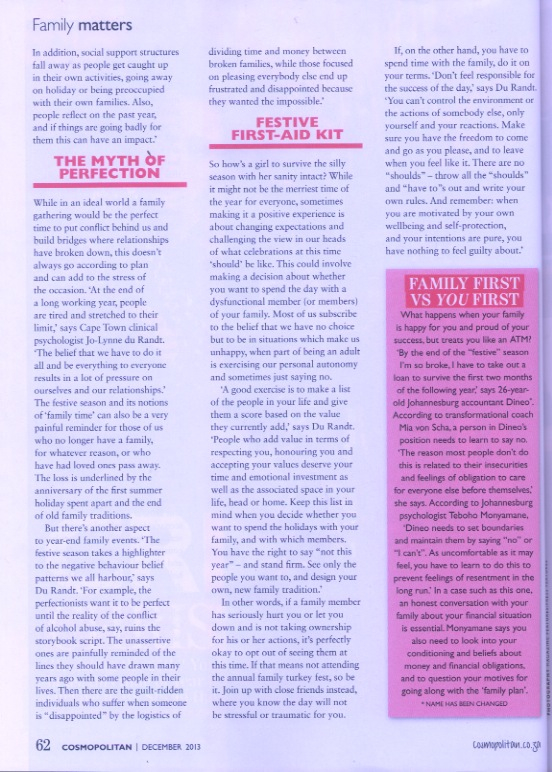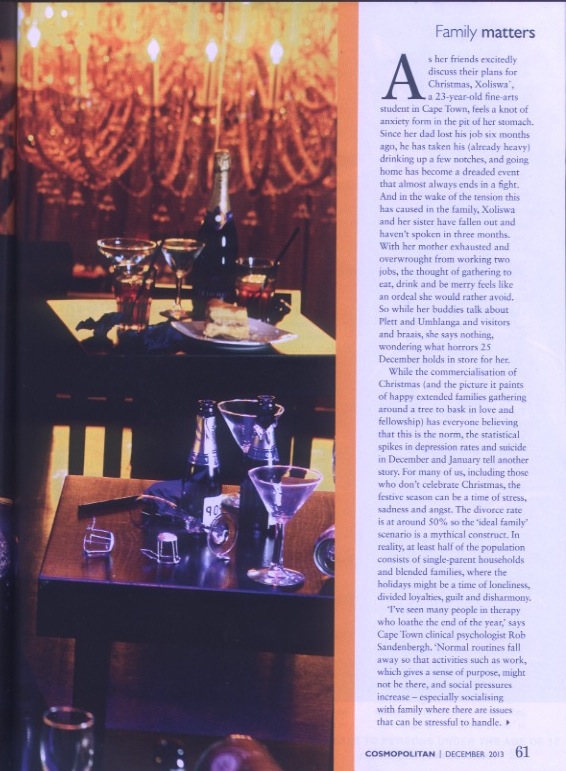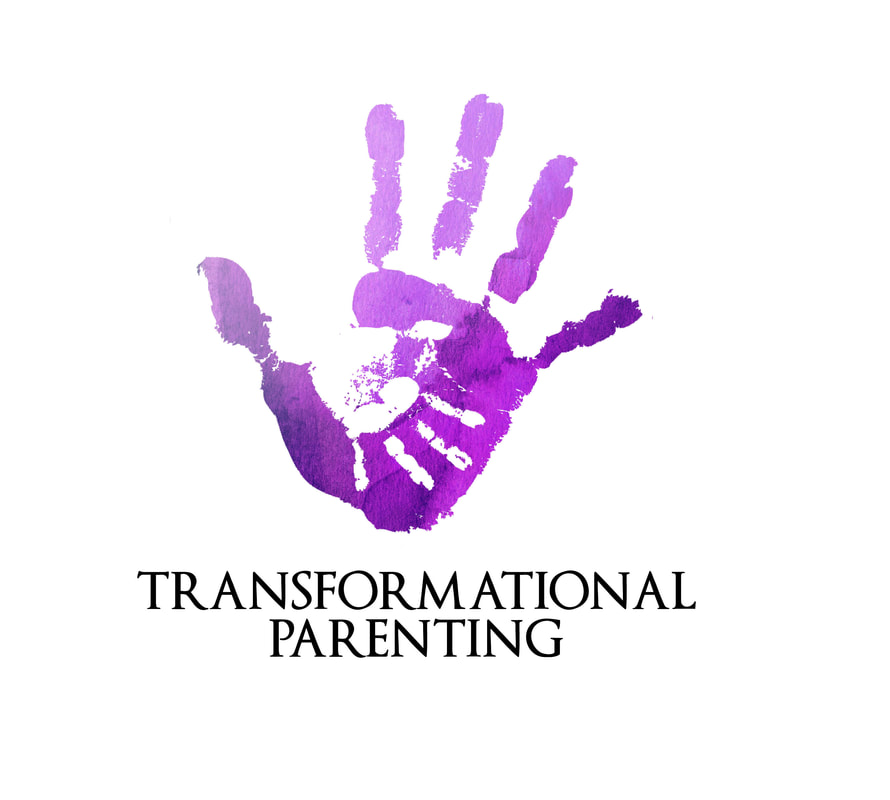
Mia Von Scha chats to Susan Hayden and Tokiso Molefe about how the festive season can become a difficult time of year - either spent alone or with a stressful family.
They look at how to deal with difficult family situations, how to handle the festive season in general and how to make the festive season fun if you find yourself alone.
They look at how to deal with difficult family situations, how to handle the festive season in general and how to make the festive season fun if you find yourself alone.
What are the various factors that lead to families being dysfunctional and reasons people feel alienated from their families?
This is a difficult question to answer in a paragraph or two. There are so many factors that can contribute to a dysfunctional family. Essentially a family is made up of a number of relationships between a number of individuals, and if any of the individuals who make up the family unit are dysfunctional themselves then this can lead to dysfunction in the family as a whole. The way that I view a family is a place where your deep seated limiting beliefs and fears can come out into the open for you to see. We project our own inner dysfunctions onto the members of our family, as these are the people closest to us. Every person in your family will mirror a different aspect of yourself (some good, some bad) to bring this into the light of your awareness so that you can work on yourself and make changes and grow and learn. Unfortunately what most people tend to do is to blame their family for their problems and never look at their own role in the dysfunction of the system as a whole. People feel alienated from their families in a large part because they don't want to deal with their own issues. Once you face your own problems and work through them your family becomes less threatening and more amusing and you are able to step aside and see them for what they are – a group of people struggling with their own conditioning and limitations and trying to find love and acceptance in the world.
How does the festive season put families under the microscope and the implications for dysfunctional families?
I guess that most people are able to avoid their families for much of the year, or to only deal with them one member at a time or for limited periods of time. What happens in most families at the end of the year is that they all come together in one place and often for a period of time that is too much to ignore the things we're usually trying to avoid. If there are major issues in the family system this is probably the time where they will all come to the surface. We unconsciously suppress a lot of our past and a lot of our fears and limitations, and when we get together with our families it is a good time for the unconscious mind to bring all of this to the surface so that it can be dealt with. There is only so long that we can repress things without it affecting our health, other relationships, career and life in general. A family gathering is an excellent time to see what you haven't dealt with and to make a resolution to clear it up.
Is there a link between festive marketing and the degree of isolation people feel?
Yes, I would definitely say so, and I think that marketing in general has a negative effect on people. We are sold "lies" by the media about the happily ever after with the picket fence and 2.5 kids, and the happy family all loving and joyous under the Christmas tree, and the mother oozing with joy and affection as she cuddles her newborn baby. It is these glossed over versions of life that make people look at their own lives and see dysfunction where there isn't any. Marriage doesn't have a happily ever after – it requires work and dedication and involves some conflict and compromise. The family under the Christmas tree all have a past and struggles with each other and things that aren't being said. And the mother with the newborn has probably not slept in weeks and is feeling tired and bored and frustrated and depressed. But because we are sold the glossy version, we think there is something wrong with us when everything does not resemble a Hollywood movie. And we start to doubt ourselves and our lives, when really we are just going through the normal motions and emotions of being a human being. Someone who is alone over the festive season has internal images taken from numerous films, adverts and magazines that tell him/her that EVERYONE else has a happy loving family to spend the day with, when in reality this is seldom true.
What can readers do if they are in this situation; in terms of feeling better and what they can do to resolve the bigger issues that lead to families being dysfunctional?
If someone does find themselves feeling alone and isolated over the festive season, the first thing to do is to find another way to look at the situation. Perhaps you could even count yourself lucky that you're not spending an excruciating day with a family that you'd rather avoid! Or simply see it as another day or time in the year just like any other – it is simply a social convention that we have decided to make some days more "special" than others – why is this day any more special than any other day in your life? Every day is a special day, every day is cause for celebration, just for the very fact that you are alive. Start to celebrate the ordinary days in your life and you will feel less like you're missing out when you'Re not doing something special on certain days determined by someone else.
With regards to the bigger issues of dysfunctional families, all we can ever do is to work on ourselves. You can never change someone else, or even persuade them to get help for themselves if they don't want to. The only thing you ever have control over in life is you, so start there. Work through things on your own or with a life coach or therapist, and find ways to let go of your blame and anger and resentment of your family. Find ways to let go of your own limitations and emotional baggage, and you will find that even if your family remains the same you will have a new way to look at them, a way that includes compassion and forgiveness and understanding.
And how can they manage their emotions at this time of year?
The best way to manage your emotions is to be as present as you can. Stay in the present moment, and aware of how you are feeling and when and why you are reacting to things. Families tend to get into habitual ways of relating to each other, and communicate and interact from that unconscious state. If even one member of the family can be fully present and just breathe through the situation and not react in the way they usually would, then the entire family pattern can be disrupted. If you are lost in your mind in the past (as we tend to be with family) or off in the future and not completely engaged in the moment, you will react unconsciously and perpetuate the family patterns and your own emotional patterns. The easiest way to remain present is to focus on your breathing. Just being fully aware of your breathing means that you are not completely lost in your mind, or in your emotions. This does take some practice, but simply watching your breathing and taking a conscious breath regularly throughout your day or doing some deep breathing specifically when you are feeling emotional can bring you out of your head and into your body. All emotional states are fuelled by the kind of thoughts that go along with them – stop the thinking and the emotional state will dissipate fairly quickly. I would also add that if you are deeply troubled, depressed or suicidal that you get help and support particularly at this time of year.
Case Study 1: Carol doesn’t get along with her family because she dropped out of Varsity to pursue a career in media. Her sisters and brother are all married, highly educated and in the professions her family prefer. When she goes home to Durban in the December break all she gets are snide comments about her profession and her single status – she hates it.
It sounds to me like Carol has some underlying doubts about her own career and status that she needs to work on. We don't get triggered emotionally by other people's comments unless we feel that there is some underlying truth to them. For example, if someone called me fat I would just laugh and shrug it off because I know I am not. But if someone called someone fat who did think that they were they would get upset and offended by it. She will need to look deeply into herself and uncover her own doubts about what she is doing and clear those out. Then she can simply shrug off her families comments or put them down to jealousy on their behalf that they have all followed the "acceptable" path rather than following their passion as she has. I would say that Carol has underlying limiting beliefs about what constitutes a successful life (ideas that would have come from her family as she was growing up) which disagree with the choices she has made. She will need to address these so that she can be at peace with her choices regardless of what her family thinks.
Case study 2: Dineo doesn’t like the holiday season because she is expected to foot the bill of everything that happens during this time because, unlike her brother, she doesn’t have a child. She feels like the family ATM. She is holding a serious grudge because in the first two months of every New Year she lives off personal loans. During the year she’s able to avoid the family because of her hectic work schedule but festive season she is home!
Dineo is a perfect example of someone who needs to learn to say "no". Unfortunately the reason most people don't say no is due to their own insecurities and feelings of obligation to care for everyone else before themselves. Most of us grow up in a culture which views looking out for yourself first as selfish. However, if we don't care for our own needs first we will end up with nothing left to give. It's like flying with a child – you'll always be told in the safety instructions to put your own air mask on first before assisting your child – why? Because if you're not ok you cannot take care of anyone else. Dineo needs to make a deal with herself that she is not going to take a loan and to have a frank and honest conversation with her family about her financial situation. She would also do well to look into her conditioning and beliefs around money and obligations and to question her motives for going along with the "family plan".
Case Study 3: Crystal’s family is a mess. Her step-mother is sweet, her step-siblings are greedy and her dad treats her step-mother badly in front of the family. She doesn’t like seeing her step-mother hurting, doesn’t get along with her father and she feels her step-siblings are lazy and living off her parents. Time with them is never easy. She only sees them when she has to.
Most of the suffering that we feel when it comes to other people is because we have all sorts of ideas in our minds about how they "should" or "shouldn't" be behaving. Sometimes we just need to take a good honest look at what is happening in reality and start with acceptance of what already is. Whether she likes the way her father and step-mother interact or not, that is the way their relationship is at the moment, and they are two consenting adults who have chosen to be in a relationship with each other. It is also their choice to provide for the step-siblings however much and for however long they choose. Time with them is probably not easy because she is spending most of her time in her mind judging them for who they currently are. And every time we judge someone else it is a good indication that there is something in ourselves that needs to be looked at. Instead of judging them she should turn that inquiry in on herself and see why she is not happy and what areas in her own life need attention. That is not to say that there aren't issues in her family that could be worked on, but they are not her problems to solve. Very often when we work on ourselves and find out own happiness, the people in our lives will also seek out the new happiness that we have found and will change and improve because we have.
Case Study 4: Mary was molested by her step-father when she was 7-years-old. After disclosing to her mother what was going on – she was sent to boarding school and has since only stayed with the family over the holidays. She’s 26-years-old and she still can’t deal with sharing a meal with a man that hurt her and a mother that blamed her. It’s a secret only known by Mary, her mom and step-dad.
In Mary's case I would say that she needs to seek professional help – to see a life coach or therapist who can help her to deal with the past and find peace in her present moment. There is no reason at the age of 26 that she should still feel obliged to go and eat meals with someone who has hurt her in this way and she needs to find the inner strength and resilience to be able to refuse if that is what she wants. Therapy can be incredibly freeing for someone in Mary's situation – to realise that the past does not have to control us forever and to be helped to a position of forgiveness and peace and the ability to move on without carrying that burden.
This is a difficult question to answer in a paragraph or two. There are so many factors that can contribute to a dysfunctional family. Essentially a family is made up of a number of relationships between a number of individuals, and if any of the individuals who make up the family unit are dysfunctional themselves then this can lead to dysfunction in the family as a whole. The way that I view a family is a place where your deep seated limiting beliefs and fears can come out into the open for you to see. We project our own inner dysfunctions onto the members of our family, as these are the people closest to us. Every person in your family will mirror a different aspect of yourself (some good, some bad) to bring this into the light of your awareness so that you can work on yourself and make changes and grow and learn. Unfortunately what most people tend to do is to blame their family for their problems and never look at their own role in the dysfunction of the system as a whole. People feel alienated from their families in a large part because they don't want to deal with their own issues. Once you face your own problems and work through them your family becomes less threatening and more amusing and you are able to step aside and see them for what they are – a group of people struggling with their own conditioning and limitations and trying to find love and acceptance in the world.
How does the festive season put families under the microscope and the implications for dysfunctional families?
I guess that most people are able to avoid their families for much of the year, or to only deal with them one member at a time or for limited periods of time. What happens in most families at the end of the year is that they all come together in one place and often for a period of time that is too much to ignore the things we're usually trying to avoid. If there are major issues in the family system this is probably the time where they will all come to the surface. We unconsciously suppress a lot of our past and a lot of our fears and limitations, and when we get together with our families it is a good time for the unconscious mind to bring all of this to the surface so that it can be dealt with. There is only so long that we can repress things without it affecting our health, other relationships, career and life in general. A family gathering is an excellent time to see what you haven't dealt with and to make a resolution to clear it up.
Is there a link between festive marketing and the degree of isolation people feel?
Yes, I would definitely say so, and I think that marketing in general has a negative effect on people. We are sold "lies" by the media about the happily ever after with the picket fence and 2.5 kids, and the happy family all loving and joyous under the Christmas tree, and the mother oozing with joy and affection as she cuddles her newborn baby. It is these glossed over versions of life that make people look at their own lives and see dysfunction where there isn't any. Marriage doesn't have a happily ever after – it requires work and dedication and involves some conflict and compromise. The family under the Christmas tree all have a past and struggles with each other and things that aren't being said. And the mother with the newborn has probably not slept in weeks and is feeling tired and bored and frustrated and depressed. But because we are sold the glossy version, we think there is something wrong with us when everything does not resemble a Hollywood movie. And we start to doubt ourselves and our lives, when really we are just going through the normal motions and emotions of being a human being. Someone who is alone over the festive season has internal images taken from numerous films, adverts and magazines that tell him/her that EVERYONE else has a happy loving family to spend the day with, when in reality this is seldom true.
What can readers do if they are in this situation; in terms of feeling better and what they can do to resolve the bigger issues that lead to families being dysfunctional?
If someone does find themselves feeling alone and isolated over the festive season, the first thing to do is to find another way to look at the situation. Perhaps you could even count yourself lucky that you're not spending an excruciating day with a family that you'd rather avoid! Or simply see it as another day or time in the year just like any other – it is simply a social convention that we have decided to make some days more "special" than others – why is this day any more special than any other day in your life? Every day is a special day, every day is cause for celebration, just for the very fact that you are alive. Start to celebrate the ordinary days in your life and you will feel less like you're missing out when you'Re not doing something special on certain days determined by someone else.
With regards to the bigger issues of dysfunctional families, all we can ever do is to work on ourselves. You can never change someone else, or even persuade them to get help for themselves if they don't want to. The only thing you ever have control over in life is you, so start there. Work through things on your own or with a life coach or therapist, and find ways to let go of your blame and anger and resentment of your family. Find ways to let go of your own limitations and emotional baggage, and you will find that even if your family remains the same you will have a new way to look at them, a way that includes compassion and forgiveness and understanding.
And how can they manage their emotions at this time of year?
The best way to manage your emotions is to be as present as you can. Stay in the present moment, and aware of how you are feeling and when and why you are reacting to things. Families tend to get into habitual ways of relating to each other, and communicate and interact from that unconscious state. If even one member of the family can be fully present and just breathe through the situation and not react in the way they usually would, then the entire family pattern can be disrupted. If you are lost in your mind in the past (as we tend to be with family) or off in the future and not completely engaged in the moment, you will react unconsciously and perpetuate the family patterns and your own emotional patterns. The easiest way to remain present is to focus on your breathing. Just being fully aware of your breathing means that you are not completely lost in your mind, or in your emotions. This does take some practice, but simply watching your breathing and taking a conscious breath regularly throughout your day or doing some deep breathing specifically when you are feeling emotional can bring you out of your head and into your body. All emotional states are fuelled by the kind of thoughts that go along with them – stop the thinking and the emotional state will dissipate fairly quickly. I would also add that if you are deeply troubled, depressed or suicidal that you get help and support particularly at this time of year.
Case Study 1: Carol doesn’t get along with her family because she dropped out of Varsity to pursue a career in media. Her sisters and brother are all married, highly educated and in the professions her family prefer. When she goes home to Durban in the December break all she gets are snide comments about her profession and her single status – she hates it.
It sounds to me like Carol has some underlying doubts about her own career and status that she needs to work on. We don't get triggered emotionally by other people's comments unless we feel that there is some underlying truth to them. For example, if someone called me fat I would just laugh and shrug it off because I know I am not. But if someone called someone fat who did think that they were they would get upset and offended by it. She will need to look deeply into herself and uncover her own doubts about what she is doing and clear those out. Then she can simply shrug off her families comments or put them down to jealousy on their behalf that they have all followed the "acceptable" path rather than following their passion as she has. I would say that Carol has underlying limiting beliefs about what constitutes a successful life (ideas that would have come from her family as she was growing up) which disagree with the choices she has made. She will need to address these so that she can be at peace with her choices regardless of what her family thinks.
Case study 2: Dineo doesn’t like the holiday season because she is expected to foot the bill of everything that happens during this time because, unlike her brother, she doesn’t have a child. She feels like the family ATM. She is holding a serious grudge because in the first two months of every New Year she lives off personal loans. During the year she’s able to avoid the family because of her hectic work schedule but festive season she is home!
Dineo is a perfect example of someone who needs to learn to say "no". Unfortunately the reason most people don't say no is due to their own insecurities and feelings of obligation to care for everyone else before themselves. Most of us grow up in a culture which views looking out for yourself first as selfish. However, if we don't care for our own needs first we will end up with nothing left to give. It's like flying with a child – you'll always be told in the safety instructions to put your own air mask on first before assisting your child – why? Because if you're not ok you cannot take care of anyone else. Dineo needs to make a deal with herself that she is not going to take a loan and to have a frank and honest conversation with her family about her financial situation. She would also do well to look into her conditioning and beliefs around money and obligations and to question her motives for going along with the "family plan".
Case Study 3: Crystal’s family is a mess. Her step-mother is sweet, her step-siblings are greedy and her dad treats her step-mother badly in front of the family. She doesn’t like seeing her step-mother hurting, doesn’t get along with her father and she feels her step-siblings are lazy and living off her parents. Time with them is never easy. She only sees them when she has to.
Most of the suffering that we feel when it comes to other people is because we have all sorts of ideas in our minds about how they "should" or "shouldn't" be behaving. Sometimes we just need to take a good honest look at what is happening in reality and start with acceptance of what already is. Whether she likes the way her father and step-mother interact or not, that is the way their relationship is at the moment, and they are two consenting adults who have chosen to be in a relationship with each other. It is also their choice to provide for the step-siblings however much and for however long they choose. Time with them is probably not easy because she is spending most of her time in her mind judging them for who they currently are. And every time we judge someone else it is a good indication that there is something in ourselves that needs to be looked at. Instead of judging them she should turn that inquiry in on herself and see why she is not happy and what areas in her own life need attention. That is not to say that there aren't issues in her family that could be worked on, but they are not her problems to solve. Very often when we work on ourselves and find out own happiness, the people in our lives will also seek out the new happiness that we have found and will change and improve because we have.
Case Study 4: Mary was molested by her step-father when she was 7-years-old. After disclosing to her mother what was going on – she was sent to boarding school and has since only stayed with the family over the holidays. She’s 26-years-old and she still can’t deal with sharing a meal with a man that hurt her and a mother that blamed her. It’s a secret only known by Mary, her mom and step-dad.
In Mary's case I would say that she needs to seek professional help – to see a life coach or therapist who can help her to deal with the past and find peace in her present moment. There is no reason at the age of 26 that she should still feel obliged to go and eat meals with someone who has hurt her in this way and she needs to find the inner strength and resilience to be able to refuse if that is what she wants. Therapy can be incredibly freeing for someone in Mary's situation – to realise that the past does not have to control us forever and to be helped to a position of forgiveness and peace and the ability to move on without carrying that burden.




